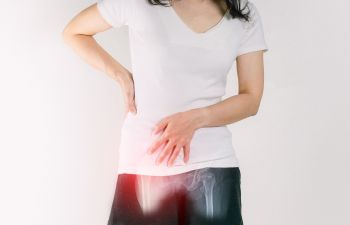When to Seek Treatment for Hip Pain

Experiencing pain anywhere in the body is uncomfortable and unpleasant. However, understanding the source of your injury can help you determine if you should seek medical attention. For example, a sore knee following a fall has a clear cause. The level of swelling, range of motion and degree of agony indicates if the area can be rested or if you should pay a visit to the doctor.
Hip pain can come on suddenly or build up over time and may not have an identifiable cause. The hips are responsible for supporting the body with bones, ligaments and joints. This can make resting the area difficult as you may experience discomfort when standing, sitting or sleeping.
Treating Hip Pain at Home
As it is difficult to elevate and rest the hip, you can use other methods to reduce discomfort. Applying gentle heat to the area, such as lying in a warm bath, is one option to try. An elevated temperature entices muscles to relax and encourages blood flow. This relieves tension and promotes healing. Alternatively, a cold compress causes blood vessels to constrict. Applying a bag of frozen peas can also reduce swelling and make you feel more comfortable.
You may find that either hot or cold is more beneficial in relieving your hip pain. However, alternating between warm and cool can maximize the reduction in agony for some people. Ensure that you always finish with an ice pack.
Unfortunately, a heating pad or ice pack will only temporarily relieve hip pain. As a result, many people choose over-the-counter medications like aspirin or ibuprofen to reduce discomfort further.
When to Contact Allied Pain & Spine Institute
Aspirin and ibuprofen will block pain receptors and provide some relief, but these medications can come with a host of serious side effects. You might experience nausea, stomach issues, or even ulcers in the short term. Larger doses may damage kidneys and increase blood pressure. Allied Pain & Spine Institute does not recommend using medication for more than ten days without seeking medical advice.
If your hip pain changes either suddenly or slowly, this is a sign that the area is not healing on its own. In addition, you should become concerned if additional symptoms such as burning, tingling or a numb feeling begin to develop.
Experiencing pain for any length of time affects your mood and quality of life. Allied Pain & Spine Institute is here to explore your treatment options, including chiropractic care, physiotherapy and much more. Call today to arrange an appointment.
Posted on behalf of Allied Pain & Spine Institute

